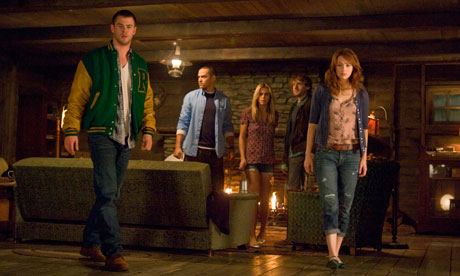Representing maybe the first real step in the reflexive
evolution of the horror film since Scream,
Drew Goddard’s The Cabin in the Woods
wades into the depths of voyeurism and pleasure that have become embedded into the
genre over nearly the last half-century. It ingeniously weaves a heightened
sense of self-awareness into a story that steers clear of parody despite
deploying an orgy of genre tropes. Much of this can be attributed to how
Goddard and co-writer Joss Whedon have structured the film. At the outset we
learn of an apparent experiment wherein two men—played with relish by Richard
Jenkins and Bradley Whitford—sit in front of screens in a control room and
manipulate the fates of five young college students who are off to spend a
weekend in a creaking cabin in the middle of nowhere. If the college student
scenario sounds derivative, that’s because it is. Each character is walking
horror cliché: the athletic jock (Chris Hemsworth), the bookish nerd (Jesse Williams), the
innocent virgin (Kristen Connolly), the promiscuous blonde (Anna Hutchinson), and the know-it-all stoner (Frank Kranz). It should
then be no surprise that the secluded settings and familiar plot turns that
ensue invoke the likes of The Evil Dead,
The Shining, Night of the Living Dead, Friday
the 13th, and innumerable others.
The overt contrast between the
increasingly violent situation at the cabin and the nonchalance of the folks
watching/enacting it becomes the film’s major sticking point, and Goddard and
Whedon make it work by pouring on the irony. They want to scare you and make
you laugh, and then make you wonder why you’re scared and laughing. The eventual
explanation for the motivations of the folks in the control room leaves something to
be desired, but the resolution seems practically irrelevant and also part of
the fun. Moreover, once it enters its third act, The Cabin in the Woods is firmly within the realm of absurdity,
carried on by its own inventiveness long after the initial intrigue of the
story wears off.
Perhaps the most unique element of all of
this is how the film maintains a balance of disparate sensibilities. It
actively conflates the serious and the non-serious, inviting a pensive engagement before revealing its
ultimate simplicity. (In fact, some of the funniest moments come from deeply
intense moments that are interrupted with obviously less important matters.) This
playful approach yields an inspired if also problematic result. It’s not a
terribly deep experiment and nor is it a reinvention of horror, but it’s a
smart take on the ostensibly inherent fixations on death and
violence that have long entrenched the genre. And in addition to its
modest attempt to reconfigure the elements of horror cinema, The Cabin in the Woods is every bit an
homage to their existence. (Drew Goddard,
2012) **

No comments:
Post a Comment